Carbon Markets Are Far From Perfect, But Businesses Say They’re Essential

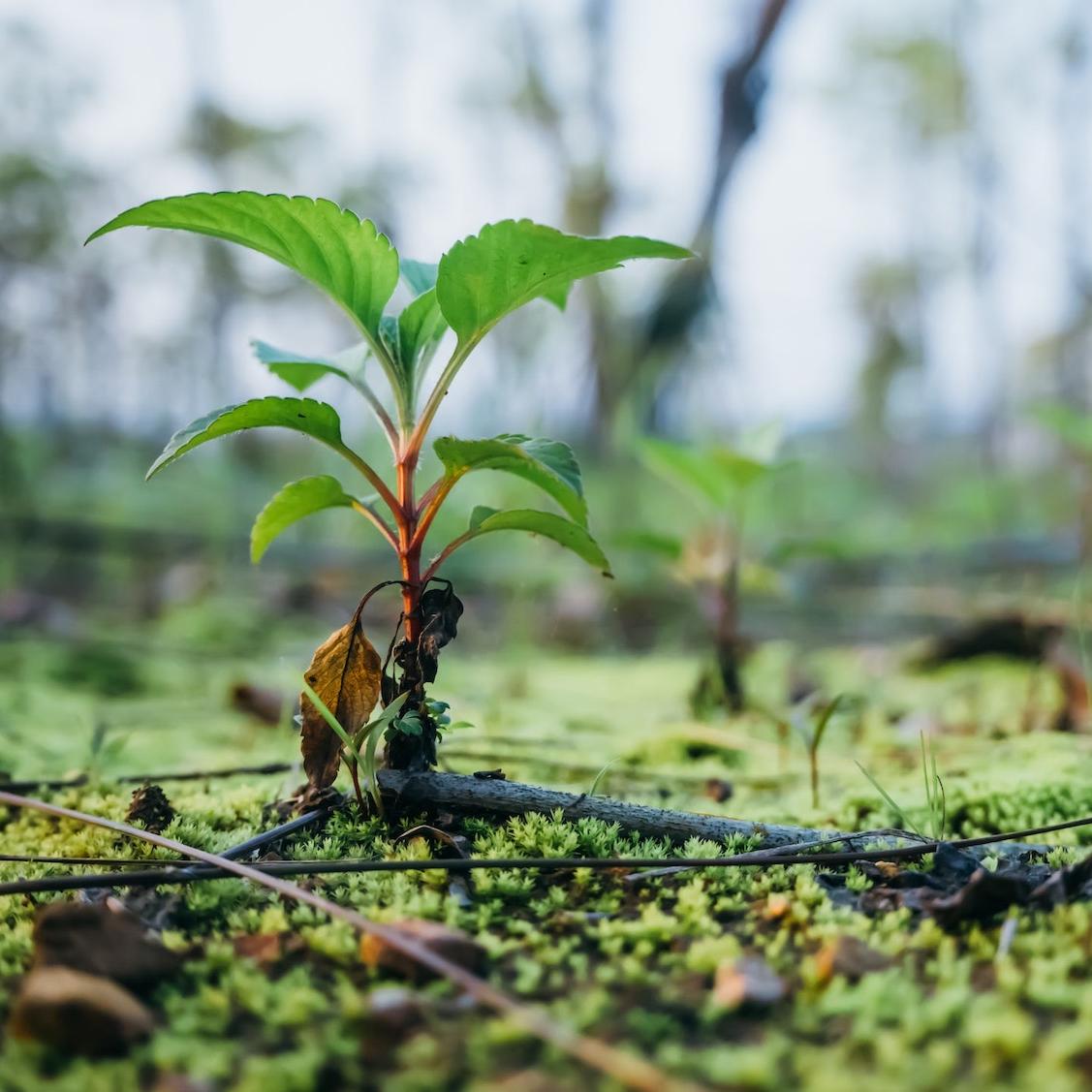
Over 90 percent of business leaders are prioritizing long-term decarbonization — and 89 percent believe carbon markets will play a key role, according to a recent survey of 500 sustainability managers conducted by Conservation International and the We Mean Business Coalition.
A third of the business leaders surveyed are already investing in a voluntary carbon market, while over half are considering carbon credits as an option for the future.
Carbon markets come under criticism...
Carbon markets allow carbon-emitting companies and individuals to offset their greenhouse gas emissions through the purchase of carbon credits. These credits are meant to be tied to certified emissions reductions from projects designed to reduce, or in some cases remove, greenhouse gases from the atmosphere. Credits are often from renewable energy projects, such as wind and solar installations, and nature-based solutions like reforestation and land restoration.
Carbon markets and credits have come under intense scrutiny in recent years due to lack of oversight and regulation. Companies and governments have been accused of greenwashing, as certain entities created fraudulent carbon credit programs that accepted payment, but never implemented carbon reduction projects. Other critics maintain that the carbon market allows companies to continue emitting greenhouse gases instead of finding methods to avoid emissions in the first place.
A recent investigation from the Guardian, Die Zeit and SourceMaterial found that more than 90 percent of rainforest carbon offset credits from a leading provider are likely to be “phantom credits” that do not represent actual greenhouse gas reductions, adding more fuel to the skepticism.
... But business leaders seem to still believe
Net-zero targets represent more than 90 percent of global GDP, and the vast majority of business leaders believe that carbon credits are a critical piece in the global decarbonization puzzle.
Over 80 percent of the business leaders surveyed by Conservation International and We Mean Business say they would like to accelerate their decarbonization plans beyond credits or offsets. They claimed to face barriers such as budgetary constraints, technological limitations, lack of collaboration, concerns about greenwashing, lack of transparency and regulation in the carbon market, and the quality of carbon credits available, which held them back.
To overcome some of the roadblocks and confusion around carbon credits, businesses are increasingly relying on carbon credit ratings agencies such as the Integrity Council for the Voluntary Carbon Market and the Voluntary Carbon Market Initiative. Carbon ratings agencies help ensure the integrity of the carbon market through robust oversight, as well as stewarding a consistent taxonomy for businesses making carbon reduction claims.
"Without a transparent, high-integrity voluntary carbon market that functions at scale, we won't stay within 1.5 degrees [Celsius]," Annette Nazareth, chair of the Integrity Council for the Voluntary Carbon Market, said in a statement. "Companies' priority must be to decarbonize their own value chains. High-integrity carbon credits allow them to go further, accelerating climate mitigation beyond their value chain by providing finance to critical climate mitigation activities that do not otherwise meet the risk and return expectations of investors. We need to find a way to make it easy for investors to recognize and price a high-integrity carbon credit no matter which program issued it, what kind of credit it is, whether it is based on a removal or reduction, a nature-based solution, or an emerging technology."
Tackling challenges in the carbon market is urgent to the activation of climate finance. Another recent report from the We Mean Business Coalition found that if the world's top 1,700 emitting companies purchased carbon credits for just 10 percent of their emissions, more than $1 trillion would be activated for climate finance by 2030.
"Climate change is the greatest test of collective action in human history, and a crisis of that scale demands an all-hands-on-deck, all-of-the- above strategy," Dr. M. Sanjayan, CEO of Conservation International, added in a statement. "Carbon credits are [a] proven tool for immediately reducing emissions, while also pursuing longer-term decarbonization ambitions. And though it isn't always reflected in the headlines, this study affirms that private-sector buyers are indeed gravitating toward high-quality credits, placing a premium on transparency and accountability."
The challenges to decarbonization are myriad, and the carbon marketplace is not yet ideal. However, many business leaders still feel a functional, scalable carbon credit system could accelerate the reduction of carbon emissions, perhaps just in time.
Image credit: aiokr chen/Unsplash
The Robot Revolution Will Negate Population Decline, Let’s Make the Most of It


A child interacts with a robot at Kuromon Market in Osaka, Japan.
For decades, environmental scientists raised alarms about overpopulation, its compounding effects on the climate and the inevitable limit to the planet’s carrying capacity. And while the agricultural Green Revolution and lower birth rates put off mass starvation and allowed us to look away from the bigger problem of overconsumption in the Global North, now it seems the shoe is on the other foot with fears of population decline making the news instead. Nowhere is this about-face more obvious than in China, where concern over fewer births has come less than a decade after the country ended its one-child policy.
At best, the accompanying doom and gloom over labor shortages and supply chains appears foolhardy when taken into the context of the robot revolution currently unfolding in just about every industry. At worst, these fears around population decline reflect a lack of vision beyond skyrocketing profits built on an ever-expanding base of consumers and cheap workers. But the convergence of a declining population with artificial intelligence (AI) capable of relieving the burden of labor actually presents a unique opportunity in human history — one in which everyone is free to pursue meaningful work with purpose.
It’s difficult to imagine such a scenario when the narrative of creating jobs has dominated politics and economics for as long as any of us can remember. Just as self-serve gas, ATMs and self-checkouts have rallied cries of lost jobs, the trend continues with robotization. So it’s no surprise that an AI-powered McDonald’s being tested in Texas has been accused of threatening “millions of jobs."
That may have been a reasonable concern when there were more workers than there were jobs, but it is baffling when taken into the context of a shrinking labor force. There are 400,000 fewer workers in the restaurant industry now than there were before the pandemic. Between the stress, low pay, unpredictable hours and poor treatment, restaurant jobs — and fast-food jobs in particular — could arguably be considered some of the worst out there. With the U.S. population screeching towards zero growth, the labor shortage in the industry is also unlikely to abate. So, why not automate?
Of course, the labor shortage isn’t limited to fast food or even restaurants in general. Other areas of hospitality and retail are suffering too, as are healthcare, education and transportation — with too heavy of a burden placed on too few staff. The resulting burnout has led to an exodus of workers, with not enough new ones available to take their place. Paige Ouimet, a professor of finance at the University of North Carolina, told the Washington Post: “When you look at the jobs that are having trouble hiring, it’s the ones with really long hours, inflexible schedules, not great pay and limited benefits.”
In other words, the jobs that can’t be filled are not great jobs to begin with. But by automating within these industries, some of the burden of labor can be relieved from the workers who are left, thus improving their job satisfaction.
By shifting our perspective away from creating jobs and focusing instead on how to get the work done most efficiently via AI in light of population decline, humankind can create an enormous opportunity for itself. But such an opportunity won’t just happen. It requires strategic planning to ensure the most miserable forms of labor are automated first — namely, those jobs that are often erroneously referred to as “unskilled” labor — along with the implementation of a universal basic income (UBI) and access to free job training, apprenticeship programs and education.
Naturally, such a scenario would be a nightmare for some of the loudest alarmists over population decline. It will be pretty difficult to round up enough colonists for Mars unless enough people are miserable enough to want to leave Earth after all.
The population doesn’t need to keep expanding in order to avoid collapse — we can do more with fewer people by harnessing the power of technology. In truth, automation will happen regardless. The choice is between embracing and planning for it so that we can create a world where all people can pursue work that gives them purpose, or falling into it at the mercy of whatever the market forces decide, potentially leading to mass unemployment and squandering our opportunity to change the nature of work for the masses of people not born into privilege.
Image credit: Andy Kelly and Andrea De Santis via Unsplash
New Taxonomy Released to Combat Greenwashing in Investments


Investors, insurers, and financial institutions in the EU have a new method for assessing the sustainability of their investments. Last week, the Observatory Against Greenwashing launched its independent Science-Based Taxonomy, in direct response to the EU Taxonomy system that some say is ineffective.
The EU Taxonomy is a classification system that claims to give investors, businesses, and financial institutions a common language for identifying the degree to which a specific investment, financial product, or economic activity can be considered sustainable.
However, critics have said the draft guidance is not sufficiently science-based and certain aspects, such as classifying gas-fired power, tree-burning, logging and nuclear energy as sustainable, could do more harm than good.
To create a more sustainable system for classifying investments, a coalition of experts and NGOs including WWF, BirdLife International, and Transport and Environment, formed the Observatory Against Greenwashing (OAG). The group aims to improve on the EU Taxonomy and provide investors with better, science-based guidance on the sustainability of their investments.
What is the independent Science-Based Taxonomy?
The independent Science-Based Taxonomy is based on the EU Taxonomy, but it only keeps the portions of the text that researchers found to be environmentally sound. It also makes more robust criteria for the parts of the EU Taxonomy that the OAG deemed unscientific or harmful to the environment.
“The EU Taxonomy was originally designed to eliminate greenwashing but instead has become another tool to deceive consumers," Vedran Kordić, EU Taxonomy coordinator from WWF Adria, said in a statement. "The science-based Taxonomy wants to succeed where the original Taxonomy failed: It will create rigorous criteria which financial institutions can use to properly assess what is green and what is not.” According to the OAG, 1 in 3 activities deemed sustainable in the EU Taxonomy actually cause planetary harm.
The EU Taxonomy was established in 2018 with a mission to inject capital into projects that would help the EU meet objectives laid out in its Green New Deal, including carbon neutrality by 2050. But critics argue the EU Taxonomy is disingenuous and fundamentally flawed due to the inclusion of natural gas and nuclear energy sources on its list of sustainable investment options.
“This isn’t good enough. We need a better taxonomy, one based on science," said Luca Bonaccorsi, sustainable finance director at Transport and Environment, a coalition of European NGOs working on transportation issues, in a statement. "Now the investor community has it.”
ESG regulations are expanding in the EU and beyond
While controversy continues to surround ESG regulation for financial products in the EU Taxonomy, the EU Commission is calling for an increase in regulation of other consumer goods and services in an attempt to respond to claims of bogus greenwashing. The EU has drafted a legal proposal that would require companies to provide scientific evidence to justify sustainability claims such as “carbon neutral” or “contains recycled materials." The draft rule also calls on EU countries to develop systems for evaluating the environmental claims of companies, including issuing penalties for businesses that do not comply.
The expansion of ESG (environmental, social and governance) regulation is not limited to Europe. In the United States, the Inflation Reduction Act is expected to channel over $400 billion into clean tech companies over the next 10 years. Additionally, the U.S. Securities and Exchange Commission is expected to finally issue its climate disclosure regulations in April, several months later than planned. The new SEC rules, if issued, would require companies to make disclosures surrounding their climate-related risks, as well as their greenhouse gas emissions and those of their supply chains.
Image credit: Alexander Tsang/Unsplash
Scientists Take a Stand for Environmental Justice Targets


People gather firewood in a forest in Sierra Leone.
We've all heard about the global push to cap temperature rise at 1.5 degrees Celsius above pre-industrial levels, which scientists agree is critical to avoid the worst impacts of climate change. But this goal alone is not enough to safeguard humanity from the harmful consequences of a warming climate, diminishing biodiversity and increasingly degraded ecosystems. To ensure those most vulnerable do not take the brunt of these impacts, climate plans must also include environmental justice targets, according to seminal research on the topic.
The Earth Commission, an international team of natural and social scientists and five working groups of additional experts, was formed in 2019 in an effort to create "the first holistic attempt to scientifically define and quantify a safe and just corridor for people and planet," according to the organization.
Last week at the World Economic Forum annual meeting in Davos, the Commission announced the upcoming launch of its first piece of research, which it describes as the first quantitative, science-based attempt to factor justice into the way we understand the environment and act to protect it.
The research, which will be published in the coming months, defines what the Commission calls “safe and just Earth System Boundaries." Researchers liken these boundaries to the 1.5-degree cap for climate, but for a much broader set of environmental factors that underpin the stability of societies, economies and human well-being.
“By centering justice at its heart, this new science represents a quantum leap in our ability to understand Earth’s capacity to sustain life, and the role we humans play as guardians of our only home and each other," Johan Rockström and Joyeeta Gupta, two of the three co-chairs of the Commission and lead authors of the research, wrote in a blog last week.
The world is on a collision course with 1.5 degrees Celsius
To say we as a global community have our work cut out for us is an understatement. Even as researchers with the Earth Commission challenge countries, localities and companies to think more broadly with their environmental plans, we're already falling short of the primary target we all agreed upon: the push to cap temperature rise at 1.5 degrees Celsius under the globally ratified Paris Agreement on climate change.
According to some estimates, a strong El Niño pattern could push the world past the 1.5-degree threshold as soon as next year. Researchers warn the results could be catastrophic.
"If the world breaches 1.5C, we are likely to trigger at least five tipping points, including the irreversible melting of the Greenland ice sheet and loss of the world’s tropical coral reef systems," Rockström and Gupta wrote in their blog. "This will be devastating for future generations. It will literally change the world, and yet every month we use 1 percent of the remaining carbon budget for 1.5C."
Environmental justice targets are needed — not only for the most vulnerable, but for everyone
From deadly flooding in Pakistan to devastating droughts across the Horn of Africa, it's clear the impacts of climate change are not felt equally.
U.N. research found that 90 percent of deaths from natural disasters over a 20-year period from 1996 to 2015 occurred in low- and middle-income countries. Further, people in lower-income countries are more likely to depend on nature for their livelihoods, leaving them more vulnerable as ecosystems degrade.
Even in developed countries, lower-income people are most affected by disasters and natural resource depletion: As a reminder, the mostly Black city of Jackson, Mississippi, still does not have access to reliable clean water, with poorer neighborhoods facing the worst of the ongoing crisis.
It's factors like these that drove the formation of the Earth Commission and the push from researchers in favor of environmental justice targets. “Planetary stability is not possible without a justice approach,” Gupta, a professor of environment and development at the University of Amsterdam, told the Guardian.
The so-called Earth System Boundaries defined in the research seek to maintain a stable environment while setting minimum levels of access to resources like food, water and energy that ensure a "dignified life" for all.
"The initial papers are expected to launch a debate about the fairest as well as the safest way to use the planet’s remaining space for development," observed Jonathan Watts, global environment editor of the Guardian. "Or in the cases where boundaries have already been crossed, to minimize impacts."
The researchers underscore that establishing environmental justice targets is not a form of charity from rich to poor. Rather, environmental justice targets are critical to protect people all over the world — and future generations.
"This breakthrough science, which moves beyond climate, can be operationalized by everyone," Rockström and Gupta wrote. "If we do nothing, or the bare minimum at this pivotal moment, we and our children — even if they are wealthy — will live in a danger zone."
Image credit: Annie Spratt/Unsplash
Municipal Green Bonds: The Next ESG Battleground


City taxpayers in states like Texas are set to lose out financially due to "anti-ESG" laws.
When red-state policymakers began to target ESG (environment, social and governance) investing for attack, it was only a matter of time before someone got hurt. As it happens, that someone is the local taxpayer. A new anti-ESG state law in Texas has already induced one city to miss out on the most competitive bid for its municipal bond sale. As for cities in blue states, growth in the market for municipal green bonds could help ensure economic health and resiliency in the era of climate change.
Somebody’s gonna get hurt: Small city loses $277,334 on bond sale
An early sign of trouble appeared last September when Bloomberg reported that the city of Anna, Texas (population 16,792) declined to pick the best bid for its bond sale. The bidder, Citigroup, apparently ran afoul of a new state law, SB 19. That law passed in 2021 with the goal of protecting gun industry stakeholders from being passed over by financial firms with ESG policies.
Citigroup is one such firm. In 2018, the company set a relatively mild "best practices" policy on gun sales for its retail clients. The new policy required background checks and a 21-year age threshold, and it limited the sale of extra-lethal equipment such as bump stocks and high-capacity magazines.
“It is not centered on an ideological mission to rid the world of firearms,” Ed Skyler, Citigroup's EVP of global public affairs, said of the policy back in 2018. “But we want to do our part as a company to prevent firearms from getting into the wrong hands.”
Skyler also noted that Citigroup's policy applied to retail clients only, not to the company's relationships with gun manufacturers, which he described as “few.” Even so, that was enough to set off alarm bells under SB 19.
As described by Bloomberg, city officials in Anna rejected Citibank’s bid after discussing the matter with the state Attorney General. They dropped the opportunity to get the best deal, reportedly costing local taxpayers $277,334.
That’s just the tip of the iceberg. Earlier this month, a Wharton analysis concluded that SB 19 and a similar bill, SB 13, will cost Texas municipal bond issuers $300 million to $500 million in additional interest over the first eight months after enactment.
A follow-up analysis commissioned by Ceres and the investor group As You Sow also indicated that similar losses are in store for cities as a group of state policymakers consider similar laws. That group includes lawmakers in Florida, Kentucky, Louisiana, Missouri, Oklahoma and West Virginia.
Picking winners and losers in the market for municipal green bonds
The prospect of a negative bottom-line outcome for city residents will probably not make red-state policymakers change their minds and stop the crusade against ESG investing. After all, punishing city dwellers to make a point is par for the course among red-state policymakers.
In contrast, blue-state taxpayers can look forward to a competitive environment for their municipal bond sales, including municipal green bonds.
Earlier this month, an organization of international investors called the Principles for Responsible Investment (PRI) released a report in support of the U.S. municipal market titled, “The thematic ESG approach in U.S. municipal bonds.”
“As the largest liquid sub-sovereign debt market in the world, the U.S. muni bond market merits consideration by ESG-minded fixed income investors,” PRI emphasized.
PRI is tasked with promoting the six ESG principles outlined by the United Nations Global Compact in 2006. More than 1,500 investment firms have signed onto the principles, with assets under management totaling an eye-popping $62 trillion.
In the report, PRI noted that municipal bonds are “well-positioned for investors pursuing a thematic ESG approach.” While cautioning that investors still need to exercise due diligence, the report's authors noted that thematic or “labelled” municipal bonds can “help investors assess and report on the environmental and social outcomes of their investments.”
PRI analyst Jasper Cox elaborated: “U.S. municipal bonds are useful for fixed income investors seeking to contribute to sustainability outcomes, since issuers of these bonds are crucial for the wellbeing of most Americans and also the transition to a low carbon economy.”
Based on data culled from PRI’s ESG reporting platform, the organization observed that momentum is growing for “thematic ESG investing in U.S. muni bonds due to increasing investor interest in environmental and social themes.”
Among other factors, the report also took note of “growing opportunities to fund climate-related projects.”
Indeed, some PRI signatories are using muni bonds to align investment objectives with the U.N. Sustainable Development Goals or, alternatively, exclude bonds linked to revenue from certain sectors, such as tobacco.
Yes, interest in municipal green bonds is growing
Earlier this month, Goldman Sachs provided another indication that the outlook for municipal green bonds in the U.S. is a healthy one — at least for blue-state cities.
“The global bond market will be an important source of investment to drive the climate transition, and green bonds finance projects with positive environmental impact,” the firm’s lead portfolio manager for green, social and impact bonds, Bram Bos, wrote in a company blog post.
Bos explained that the market for municipal green bonds is expanding as the twin forces of investor interest and government policymaking come to bear. Though much of the activity has been centered in Europe, Goldman Sachs expects the pace to pick up in the U.S. and elsewhere in the coming years, Bos reported.
That outlook was affirmed back in 2021 by Fidelity, which issued a white paper noting that municipal green bonds were a small but growing segment of the market.
“Provided that the bonds meet the investor’s current investment objectives and that the investor understands the associated risks, Green Bonds may present a unique investment opportunity,” Fidelity stated.
ESG is here to stay
CNN ran the numbers earlier this week and reported that “sustainable investing generated returns similar to the market” last year. That’s an interesting contrast with the New York Times, which ran a string of articles critical of ESG investing last year.
Among other data indicating strength in the ESG area, CNN cited the Morningstar U.S. Sustainability Index, which fell 18.9 percent in 2022. That may look bad at first, but in the context of an overall market downturn, the Index actually did better than the S&P 500 — which fell 19.4 percent.
Against this backdrop, the anti-ESG, “anti-woke” movement is simply another Republican exercise in performative politics, aimed at mollifying their supporters in the fossil energy and weapons industries while feeding the emotions of their angry base, regardless of the consequences for everyone else.
It's little wonder that the Republican Party underperformed expectations in the 2022 midterm elections by a wide margin. The world is passing them by, and that includes ESG investors and the voters who benefit from fact-based financial decision-making in the era of climate change.
Image credit: Perry Merrity II/Unsplash
23 New Plant-Based Foods Coming to Market in 2023


Even if they don't go fully vegan or vegetarian, research indicates a growing number of people are adding more plant-based foods to their diet. That's great news for the planet, as studies also show that even eating less meat and dairy can significantly reduce greenhouse gas emissions and environmental degradation tied to large-scale farming.
From both an environmental and human health perspective, there's no substitute for meals made from whole foods like fruits, veggies, grains and legumes — which are more nutritious and tend to come with less packaging waste. But if you're looking for more variety or simply something that's easy to grab on the go, an ever-growing list of brands have you covered. Here's a roundup of what's coming soon to restaurants and retailers near you.
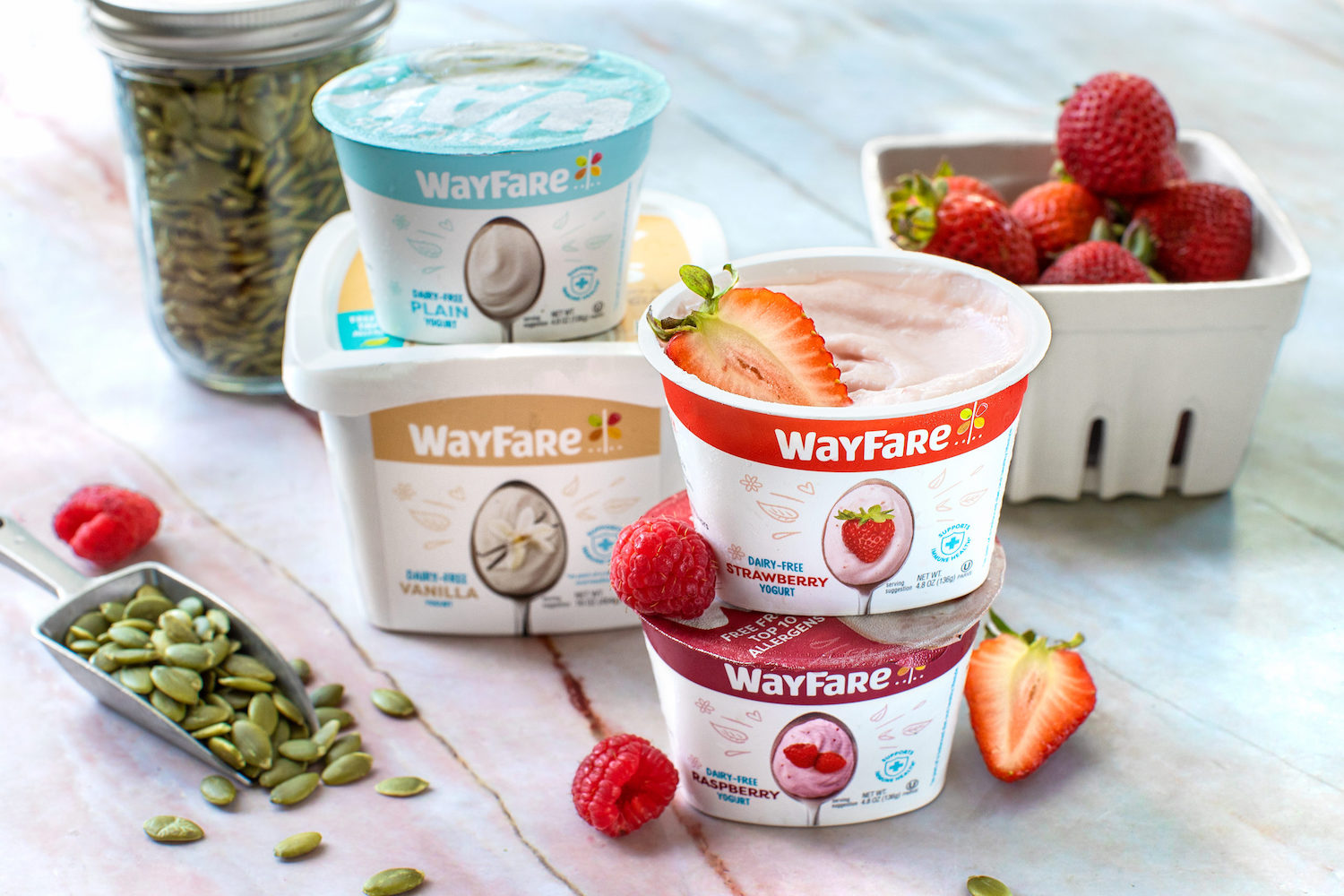
WayFare meets the market with plant-based yogurt line
The global vegan yogurt market is set to reach nearly $11 billion by 2030 as more brands get into the game. Among the new kids on the block is a freshly-launched yogurt line from WayFare made with pumpkin seeds, butter beans and oats. Plain, strawberry and raspberry flavors are already available online and in Midwest retailers like Jewel, with a vanilla flavor set to launch later this year — adding to the brand's existing lineup of plant-based butter, cheese and dessert.
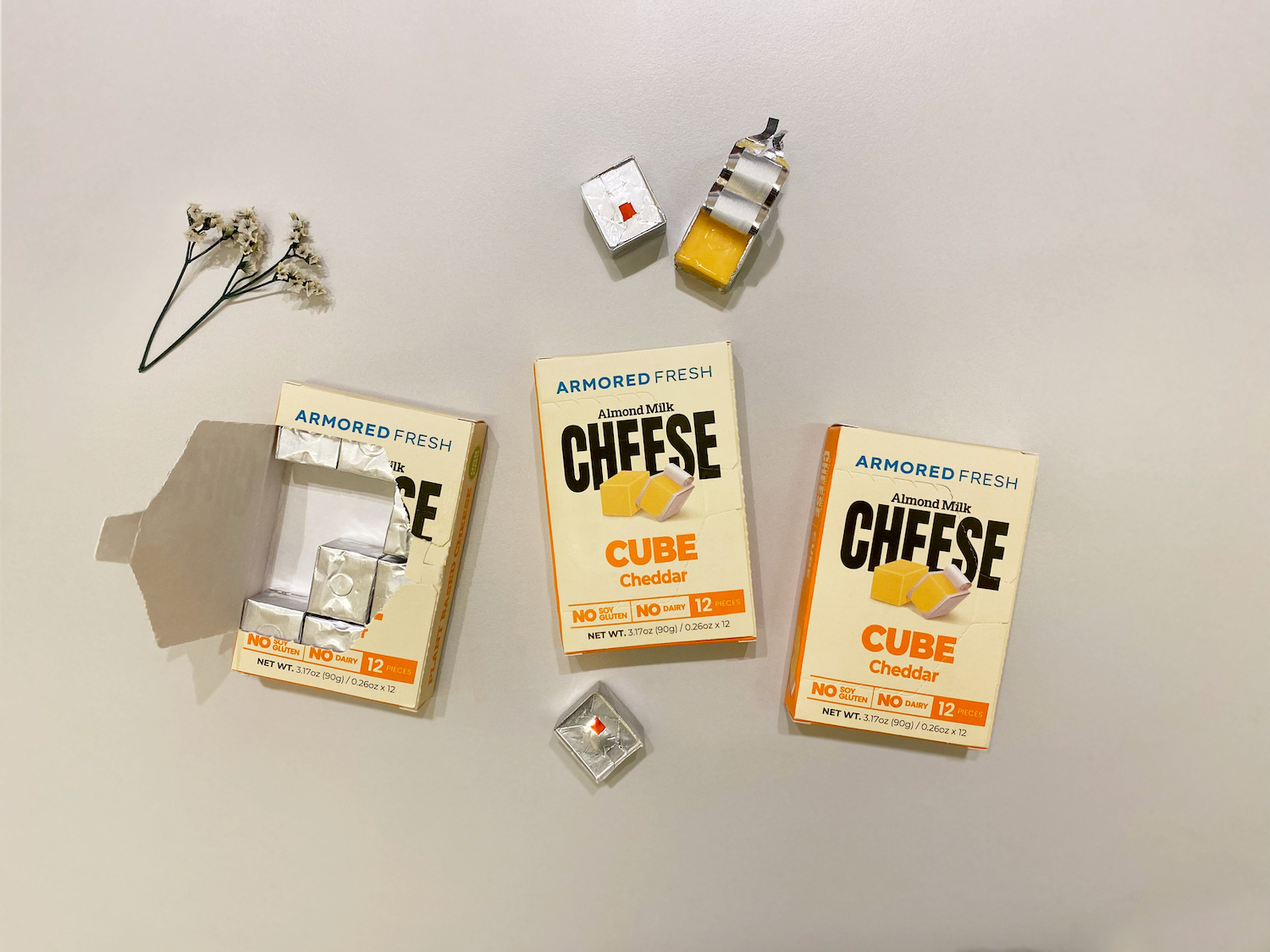
Upstart vegan cheese brand Armored Fresh eyes U.S. national rollout
With the global vegan cheese market set to reach $4.7 billion by 2026, the time is now for brands to stake their claim. South Korean food technology company Armored Fresh is one of the newest additions to the U.S. market, making its debut in October at more than 100 corner grocers in New York City. This year, the brand is going national — with a plan to start selling almond milk cheese cubes and cheese slices on its website later this month. Shredded cheeses and cheese spreads, made from its proprietary fermentation process that mimics dairy cheesemaking, are soon to follow, the company said.

Startup Crafty Counter launches vegan hard-boiled egg alternative made from nuts
As egg prices skyrocket amidst the worst U.S. bird flu outbreak on record, largely linked to factory farming operations and lax animal welfare standards, more shoppers are warming to the prospect of plant-based alternatives.
Curious consumers now have plenty of options to choose from — including this new vegan hard-boiled egg alternative from Texas startup Crafty Counter. Marketed as the first plant-based hard-boiled eggs to hit the U.S. market, the nut-based WunderEggs hit Whole Foods stores across the U.S. earlier this month and are also available on the company's website. They've already received a stamp of approval from Hong Kong environmental news platform Green Queen, who said they "look, feel and taste like chicken eggs." A vegan alternative to egg white patties is expected from the brand later this year.

Aqua Cultured Foods plans new manufacturing plant for vegan seafood in Chicago’s West Loop
Analog seafood is another plant-based foods segment that's booming, with sales expected to reach $1.3 billion globally by 2031. Food tech startup Aqua Cultured Foods is well positioned to get an early foot in the door, having just started construction on a new facility to scale up production of its whole-cut, plant-based seafood. The company says it's developing "ultra-realistic" calamari, shrimp, scallops, and sushi-grade filets of tuna, sea bass and whitefish with proprietary mycoprotein fermentation processes, and it expects to begin introducing its products to market this spring.

Tabitha Brown brings 30+ new plant-based foods to Target
Target just dropped the third of four planned capsule collections with actress and social media superstar Tabitha Brown. Known for her vegan cooking, the 2023 launch is right on track for Brown — including 34 new plant-based foods, as well as cookware, tableware and entertaining items. Brown’s collection includes vegan sausages, burger patties and ravioli, as well as ready-made meals like chickpea chili and pasta salad.
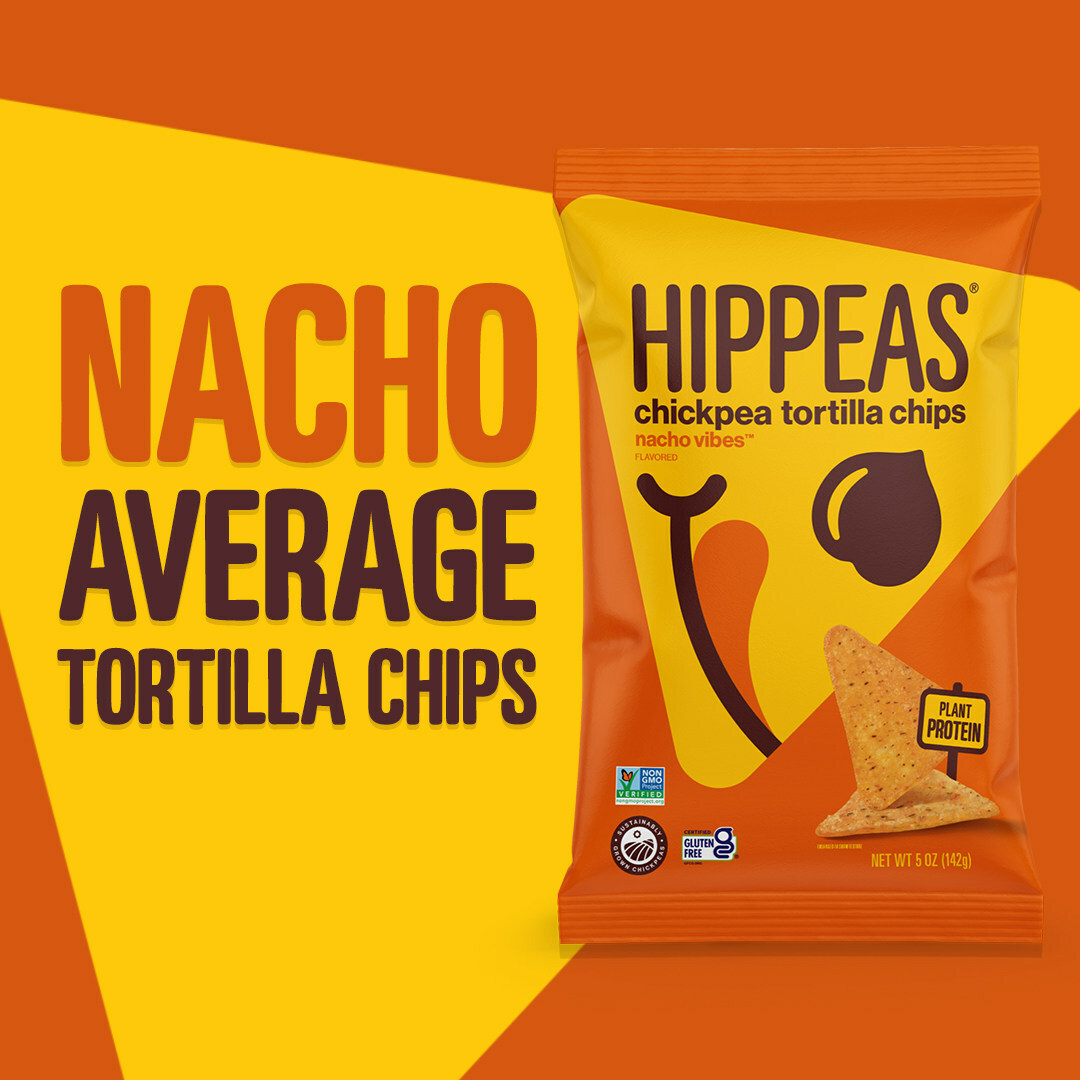
Hippeas has an answer to vegan Dorito's
Sadly, nacho-flavored Dorito's are not vegan, but if the craving strikes, these new chips from Hippeas may be the next best thing. Launched earlier this month, the new Nacho Vibes flavor of Hippeas' chickpea tortilla chips "more than stands up well next to its mainstream competitor from a taste and texture standpoint," the company's CMO, Julia Hecht, claims — and with chickpeas as the main ingredient, they're also packed with protein. Find them now in Sprouts Farmers Markets and select retailers across the U.S. as well as on Amazon and Hippeas.com.

Ben & Jerry's latest vegan ice cream flavor serves up nostalgia with an upstart brand
Ben & Jerry's fans still mourning the loss of Oatmeal Cookie Chunk will cheer the launch of a new non-dairy alternative — which the folks over at VegNews say will bring back childhood memories of Little Debbie oatmeal cream pies. The new Oatmeal Crème Pie flavor includes marshmallow swirls and gluten-free, vegan cookies from Black-owned upstart brand Partake, which focuses on allergy-friendly ingredients. The new flavor is a permanent addition to Ben & Jerry's non-dairy lineup.

Violife adds dairy-free sour cream to the lineup
Greek brand Violife has been in the dairy-free game since the 1990s and is now the top-selling vegan cheese brand in the U.S. Its expansive product portfolio includes all types of plant-based cheese, as well as vegan butters, dips and spreads. A vegan sour cream alternative is the latest on the list. Made from simple ingredients like coconut oil and potato and tapioca starches, Violife's Just Like Sour Cream is meant to substitute seamlessly in all your favorite recipes — from TexMex night, to baked potato topping, to tangy baked goods. Find it now in U.S. Walmart locations.

Nutr wants to boost the nutritional profile of your homemade plant-based milk
Nutr burst onto the scene in 2021 with a single-serving machine that makes a variety of plant-based milks with less hassle and mess. Anyone who's made plant-based milk at home knows it's often tricky, with the outcome turning out chunky, grainy and less than pleasant. Reviews from all over the web indicate the Nutr machine solves those challenges once and for all, producing fresh and creamy milk alternatives from nuts, seeds, oats, rice, soy or coconut.
In February, the folks behind the Nutr are looking to do it again with Nutr Blends, a line of organic flavored powders like matcha, vanilla-cinnamon and chocolate that are made to be added to homemade nut milks. The powders offer a nutritional boost that matches the vitamins and minerals found in cow’s milk, alongside superfoods and adaptogens in a blend developed by certified nutritionists.
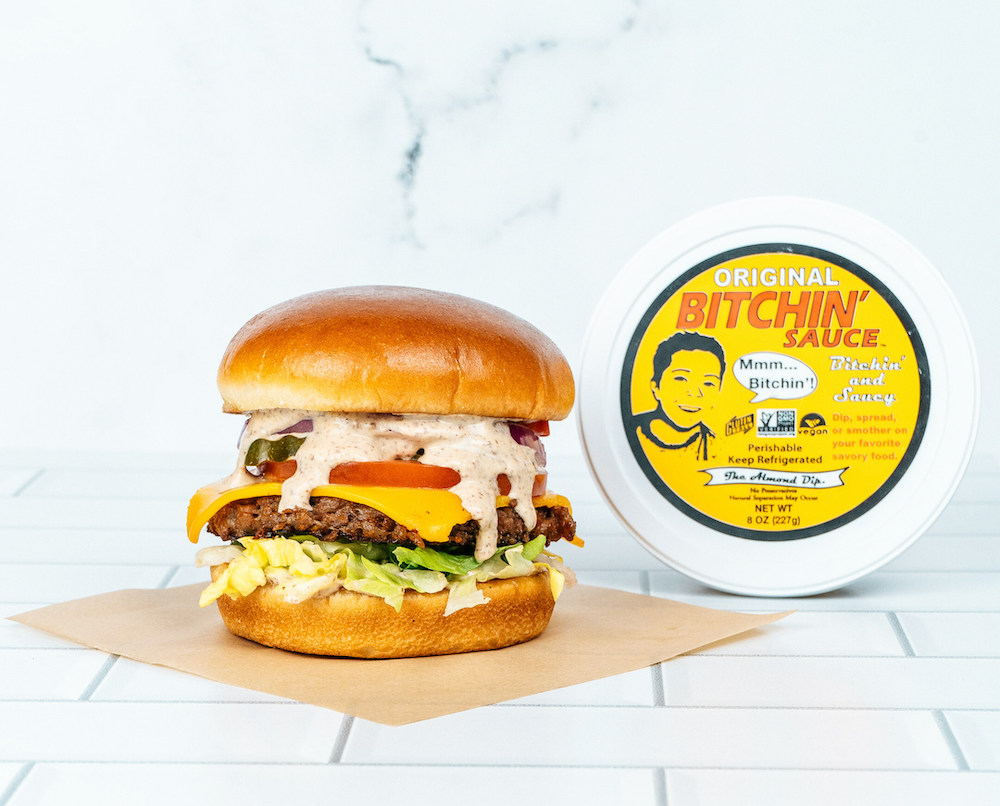
Veggie Grill launches limited-time 'Bitchin' Menu' collaboration
This month plant-based foods chain Veggie Grill is teaming up with Bitchin' Sauce, a cult-favorite brand of creamy vegan dips sold in more than 12,000 retailers nationwide. The menu collab includes a plant-based burger, salad, sandwich and nachos topped with almond-based Bitchin' Sauce, available for a limited time at Veggie Grill locations in California, Oregon, Washington, Illinois, Massachusetts and New York City.

Domino's U.K. is making U.S. fans jealous with new vegan American Hot pizza
Domino's piloted vegan pizza at 46 locations in the U.K. last year before rolling it out across the country in September. This month, the chain's U.K. division is poking some fun at U.S. fans with a vegan version of its American Hot pizza. The new pie is topped with red onions, jalapeños, dairy-free mozzarella and plant-based pepperoni from the Vegetarian Butcher on Domino's signature vegan dough, and it's available at all U.K. locations and on the Domino's U.K. app.

Silk and So Delicious Dairy Free are coming for your morning cup
Danone North America brands Silk and So Delicious Dairy Free both dropped new plant-based coffee creamers this month. So Delicious re-introduced its coconut milk creamers with what it promises will be an even better taste and texture, while Silk says its new Mocha Almond Creamer is the first chocolate plant-based creamer sold outside the holiday season. The Silk creamer is available at mainstream retailers across the U.S., and two flavors of the So Delicious coconut milk creamer can be found at Whole Foods, Sprouts, Ahold and Kroger grocery stores.

Iron Chef-founded MingsBings hits the shelves at Publix and Sprouts
Plant-based brand MingsBings is coming to the frozen food aisle at a combined 1,200 Publix and Sprouts locations across the U.S. Founded by Iron Chef alum Ming Tsai, the brand is all about blending Eastern and Western cultures, with a lineup of Chinese flatbread pockets called "bings" inspired by traditionally Western favorites like tacos, cheeseburgers and egg sandwiches. Launched as a direct-to-consumer brand, MingBings is growing fast in the plant-based foods segment and is now on shelves at over 4,000 U.S. grocery stores, including Wegmans, Whole Foods and select Targets, as well as Publix and Sprouts.
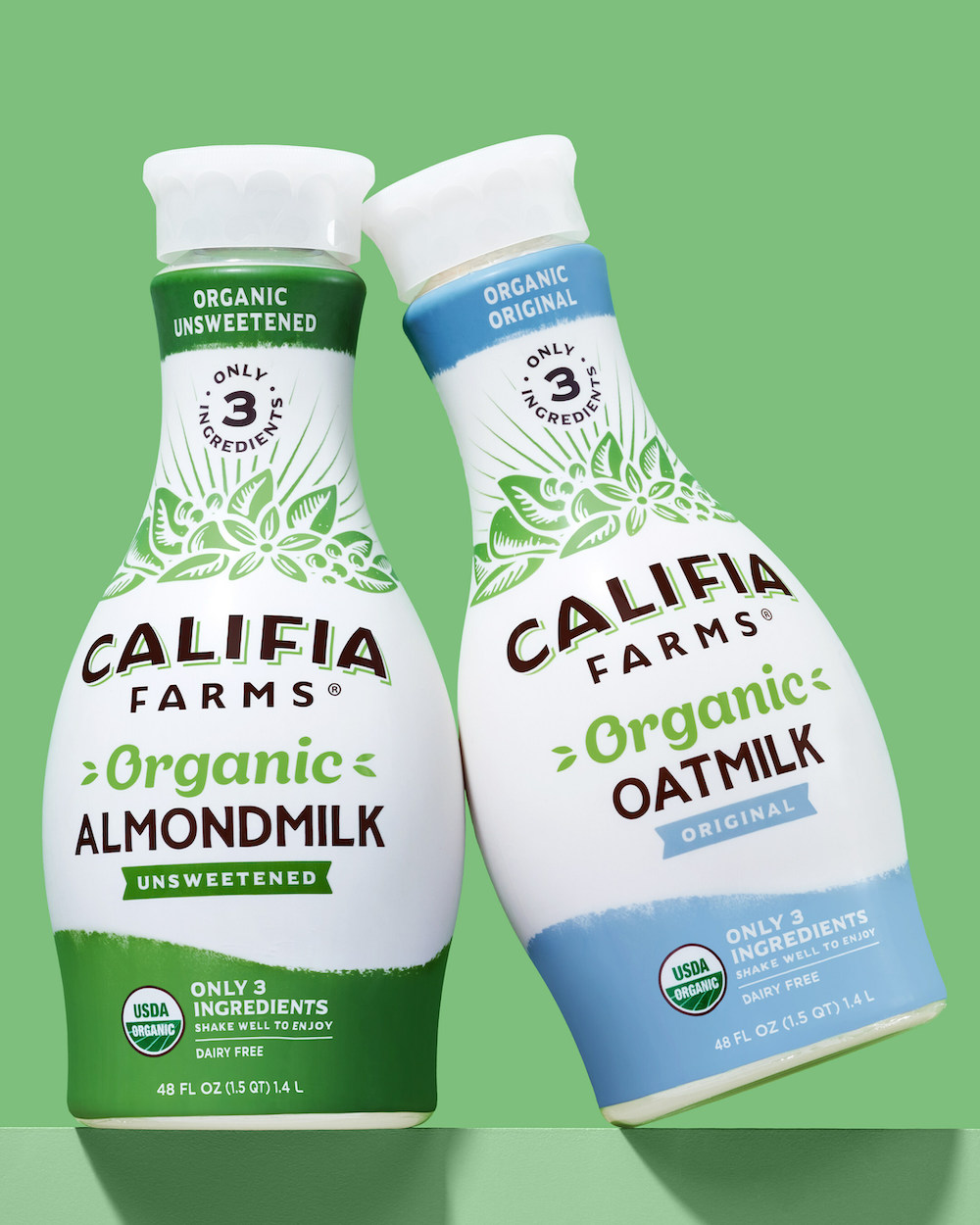
Califia Farms goes organic
Califia Farms is already a leader in plant-based beverages, with a wide range of products including plant milks, coffee creamers, juices and more. Now, it's introducing USDA-certified organic versions of its top-selling oat milk and almond milk. Both blends contain only three ingredients — purified water, sea salt, and oats or almonds — and are available at mainstream U.S. grocers including Kroger and Whole Foods.

Burger King Germany tests out new breading to differentiate plant-based foods, while vegan bacon hits the menu in the U.K.
Burger King customers in Germany saw a plant-based version of the Long Chicken Cheddar Style, featuring vegan cheese from Violife, hit the menu this month. The chain's German division also worked with the Vegetarian Butcher to develop a new parsley breading for its plant-based fried products so workers can easily differentiate them and cook them in a designated frier to be used only for vegan foods.
Meanwhile, Burger King locations across the U.K. will start serving a vegan bacon alternative made by Natalie Portman-backed brand La Vie, after a successful trial at select stores in France last year.

Chipotle adds new plant-based bowls
Chipotle kicked off the new year with a lineup of "lifestyle bowls" tailored to suit diets like vegan, keto and Whole30. On the vegan side of things, Chipotle fans can choose a bowl with or without Sofritas, the chain's first plant-based protein launched back in 2014. All the new bowls are available via online order only across the U.S. and Canada.

Subway U.K. gives plant-based foods a go
Subway U.K. is making its first foray into plant-based foods with a new teriyaki sub featuring alt steak created in partnership with the Vegetarian Butcher, a Unilever brand that also works with other major chains like Domino's and Burger King in Europe. The teriyaki steak sub will be available until Feb. 28 at Subway locations in the U.K. and Ireland, but the Vegetarian Butcher plans to launch additional plant-based options with Subway U.K. later in the year, VegNews reports.

Sprouts debuts cupcake collab between farmers and a social enterprise bakery
Shoppers at over 380 Sprouts stores across the U.S. will now find Rubicon Bakers' Vegan Lemon Raspberry Cupcakes in the bakery section. It's marketed as a creative collaboration between Washington red raspberry farmers and the B Corp bakery Rubicon Bakers, which hires people who have experienced significant barriers to employment, including housing insecurity and incarceration. These sweet vegan treats will be available until March 5.

Food tech startup Vgarden offers a new take on canned tuna
Israeli food tech startup Vgarden has already developed an impressive lineup of plant-based foods — from meat and fish alternatives to vegan pastries, cheeses and spreads. Next up, the company is tackling the world's most popular fish in perhaps its most humble form. Perfect for salads and sandwiches, Vgarden says its latest launch offers the same appearance, texture and flavor of tinned tuna without the environmental impact of overfishing. The private-label product is already being rolled out in the retail and food service sectors, the company said.

7-Eleven gets into vegan grab-and-go in Canada and Sweden
Convenience store chain 7-Eleven is jumping into the plant-based foods space with both feet — literally. Over the past month, the chain has started serving up Oatly oat milk up at coffee stations and linked up with Just Egg, Impossible Foods and Violife for its first vegan breakfast sandwich. The breakfast sammie is now available at 550 stores across Canada, while 90 locations in Sweden will test out oat milk as a push-button option at 7-Eleven coffee machines. As the chain likes to say, "Oh thank heaven."
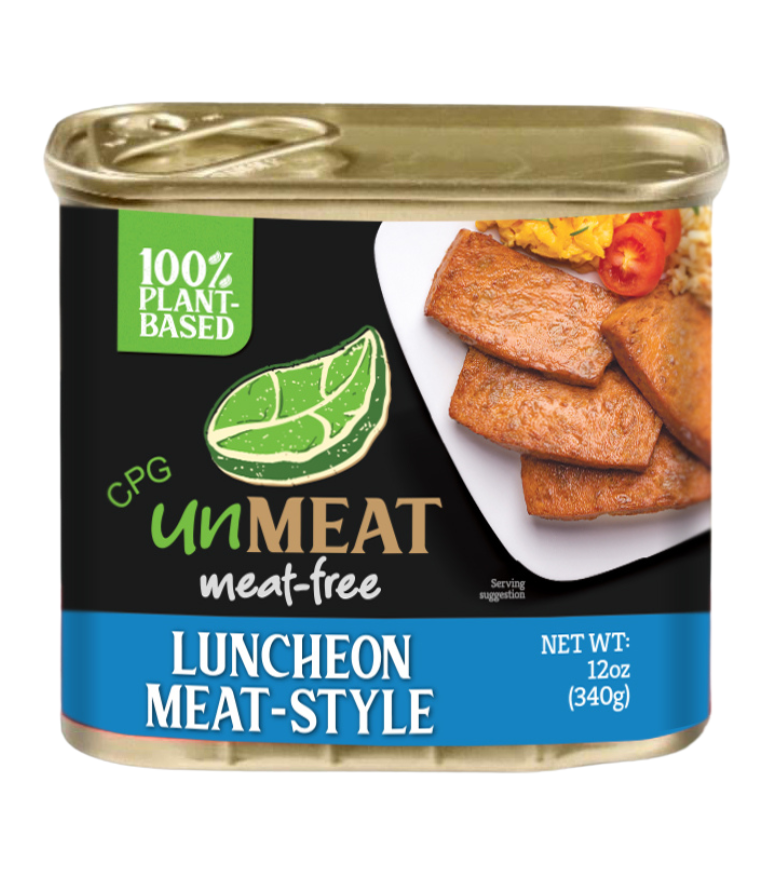
Vegan Spam alternative is coming to Walmart shelves
Spam is possibly one of the most controversial meats out there — a head-scratcher for many, a nostalgic choice for some and a beloved delicacy for others (including diners in Hawaii, who have embraced the canned meat as a cultural staple). Those looking for a vegan version got their wish last year as plant-based foods brand unMEAT added tinned Luncheon Style Meat to its lineup that already includes analog burgers, tuna and chicken alternatives, and more. This year, the product will be available to a much larger audience, having rolled out on Walmart stores last week on top of smaller grocers like HEB and Harris Teeter.

Kelly Clarkson and the Jonas Brothers collab on vegan popcorn
Rob Garbowsky's son is a close friend of the pop trio the Jonas Brothers, and he often made popcorn for the boys backstage. Fast forward to 2021, and Rob and the band turned the tasty recipe into a full-blown business, fittingly named Rob’s Backstage Popcorn. The latest to join the lineup is a barbecue flavor developed with fellow musician and American Idol winner Kelly Clarkson, whose Southern roots inspired the sweet and smoky mix that just so happens to be vegan. Find it online now and in mainstream grocers like Kroger and Sam's Club later this month.
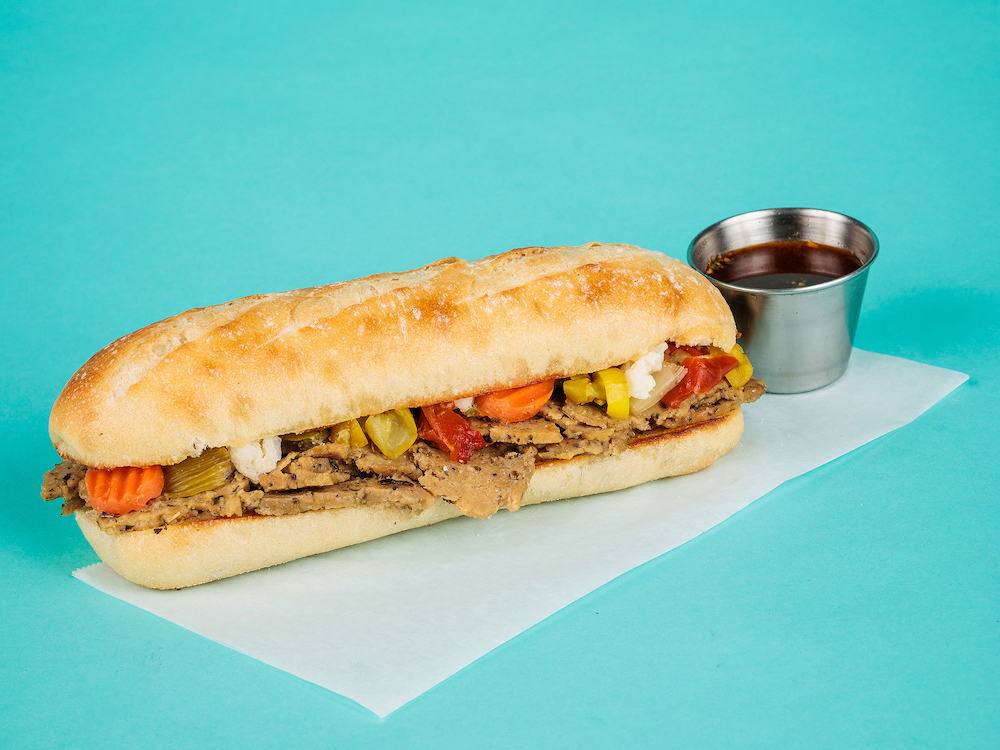
Native Foods does Chicago proud with plant-based Italian Beef sandwich
The Italian Beef sandwich originated in Chicago in the 1930s and has remained a mainstay for diners in the city. So it makes sense that Chicago-based chain eatery Native Foods would offer a vegan take on this city favorite. The sandwich has all the classic elements of the original — plant-based sliced roast beef, mild giardiniera cheese, a toasted baguette and au jus for dipping — and is entirely vegan. Find it now at Native Foods locations in Chicago, California and Colorado.
(Featured images courtesy of Armored Fresh and Target)